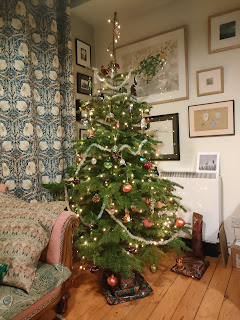I'm ending the year feeling far from well - at a guess, this is what flu, when you've had a vaccine, feels like (either that or I'm totally burnt out, or maybe it's both). Anyway, I'm on day two of trying to write this post and crossing my fingers that it'll make sense because currently my conversational attempts really don't. Grammarly is trying to tell me I'm failing but it has some funny ideas about the right words so I'm ignoring it.
I have wanted to read Hotel Splendide for a very long time; ever since seeing it mentioned by Anthony Bourdain and reading about it in Slightly Foxed. I did manage to track down a copy of Hotel Bemelmans, but my memory of it is somewhat different so I'm no longer assuming they're the same book as I have done for years.
Ludwig Bemelmans emigrated to America (from Austria) when he was 16, started working s a bus boy in one of the big New York hotels working his way up before becoming better known as an artist and writer (he wrote, amongst other things, the Madeline books). He landed in America in 1914, and first published this book in 1941 when he was already an established children's author, which is perhaps why there's not much sense of Bemelmans behind the stories. This is very much the story of life in a grand hotel before prohibition and the great depression, which must have felt like an entirely different and infinitely more decadent world in the 1940s - maybe even more than it does to us now.
It's a mostly funny and charming book with some fascinating insights into both the people he encountered and the many eccentricities of the staff, as well as of the times. In one episode goes back to Austria some time in the 1930s (superinflation is in full effect) with another colleague who went to America at the same sort of time. They have a sort of plan to humiliate the professor who had made life a misery at school, but find things so changed, and so desperate, that they end up pitying him. there must be a propaganda element to this vignette, but the banality of the whole thing makes it work better than perhaps it should.
The chapter I found most troubling is where the hotel's only black employee is fetishized with an artist's eye - does he look more beautiful in this setting or that? Against copper pans or silverware? His habits and vanities are set before us, but by the end of the book they're no more remarkable than anybody else's foibles. Still, it's a section that made me feel uncomfortable for the way it focuses on what Bemelmans clearly considered exotic.
They're possibly also the most revealing moments regarding Bemelmans own personality. Bourdain referred to him as the original bad boy of the New York hotel scene - a high bar to clear, but you'd have to do some reading between the lines to think of him in that way from this book. That's probably a good thing and why this deserves it's place as a classic. I doubt the unvarnished truth would have aged well, whereas this carefully edited collection of anecdotes and pen portraits is an absolute gem.

























.jpg)
.jpg)